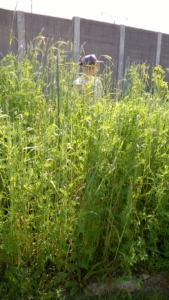Plant-based Resistance
April 29, 2025
A friend said to me, “I am not doing anything for the resistance.” But, when I think of what they spend time and energy on, I think they are! After all, these days it doesn’t take much to be rebellious.
 What plant-based activities might demonstrate resistance? Which ones might be interpreted as modeling fair play, care and concern, understanding, a reciprocal relationship with nature, integrity, or common sense?
What plant-based activities might demonstrate resistance? Which ones might be interpreted as modeling fair play, care and concern, understanding, a reciprocal relationship with nature, integrity, or common sense?
Do you save seeds? I have Romano yellow bean seeds that I have saved for years. My neighbor’s mother brought them from Romania and she shared some when the family moved to Seattle. Heritage seeds are passed down from generations, without breeding modifications. These genetically stable seeds retain their unique characteristics. (Ojo! If your seeds are patented by a corporation, it is illegal to use them or trade them for biodiversity purposes.) Seed saving has a very long history. When Indigenous Peoples were marched off of their land many sewed seeds in their clothing, hoping not to starve when they arrived at their new destination.
Do you nurture the soil? You show a reciprocal relationship with nature without realizing it. When your food plants are growing and taking nutrients from the soil, you give back. Giving back might take the form of avoiding harsh chemicals or making sure the soil is mulched so microbes can stay busy pooping nitrogen in a plant available form. Planting cover crops is a return to the earth. Minimal slicing and dicing of the soil helps maintain important fungal relationships and optimal soil structure.
for work parties
Please email to volunteer
freewayestatescommunityorchard@gmail
 Do you grow and share food? If you grow on public land, you are making good use of the commons. You are practicing cooperation and creating community. Growing food may feed you and others but it can be spiritual as well. You connect with where you came from and, eventually, where you will go. Gardening can give you space and time to ponder connection, relationships and rootedness.
Do you grow and share food? If you grow on public land, you are making good use of the commons. You are practicing cooperation and creating community. Growing food may feed you and others but it can be spiritual as well. You connect with where you came from and, eventually, where you will go. Gardening can give you space and time to ponder connection, relationships and rootedness.
Do you work or play with children in nature? An employee of a nature-based preschool told me that having children name plants is fun. It can spark the idea that plants are our brothers and sisters, not just objects. When you let the child lead the way you find out what plants they are curious about.
Do you activate natural areas within the City to help ensure that these oases continue? You could walk slowly in your favorite nature spot, or stop to make observations about design, colors, companion plants, survival characteristics, or adaptation. Respecting plants is a nice way to resistance the concept of hierarchy.
If you have another example of plant-based resistance, add it as a Comment!
Ruth



Thanks Ruth. Seems like a kind of mindfulness in how we do what we do.